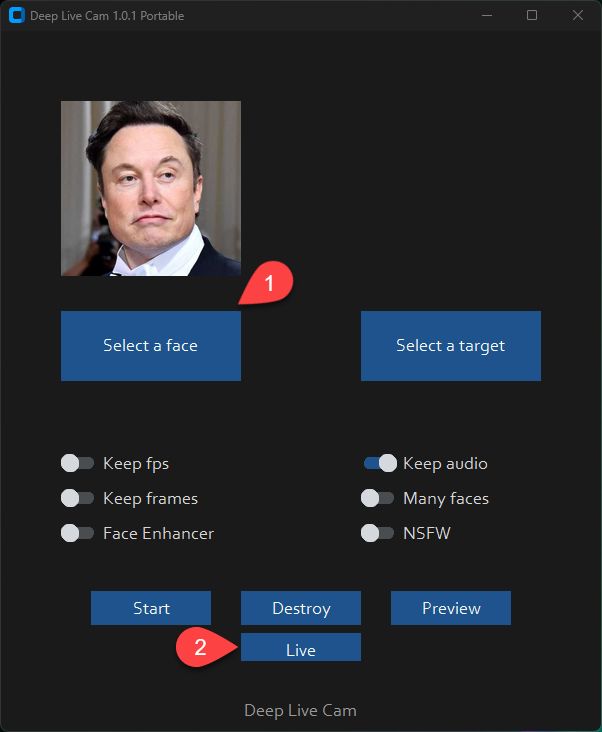This software is meant to be a productive contribution to the rapidly growing AI-generated media industry. It will help artists with tasks such as animating a custom character or using the character as a model for clothing etc.
The developers of this software are aware of its possible unethical applicaitons and are committed to take preventative measures against them. It has a built-in check which prevents the program from working on inappropriate media including but not limited to nudity, graphic content, sensitive material such as war footage etc. We will continue to develop this project in the positive direction while adhering to law and ethics. This project may be shut down or include watermarks on the output if requested by law.
Users of this software are expected to use this software responsibly while abiding the local law. If face of a real person is being used, users are suggested to get consent from the concerned person and clearly mention that it is a deepfake when posting content online. Developers of this software will not be responsible for actions of end-users.
Basic: It is more likely to work on your computer but it will also be very slow. You can follow instructions for the basic install (This usually runs via CPU)
- python (3.10 recommended)
- pip
- git
- ffmpeg
- visual studio 2022 runtimes (windows)
https://github.com/hacksider/Deep-Live-Cam.git
Then put those 2 files on the "models" folder
We highly recommend to work with a venv to avoid issues.
pip install -r requirements.txt
DONE!!! If you dont have any GPU, You should be able to run roop using python run.py command. Keep in mind that while running the program for first time, it will download some models which can take time depending on your network connection.
-
Install CUDA Toolkit 11.8
-
Install dependencies:
pip uninstall onnxruntime onnxruntime-gpu
pip install onnxruntime-gpu==1.15.1
- Usage in case the provider is available:
python run.py --execution-provider cuda
- Install dependencies:
pip uninstall onnxruntime onnxruntime-silicon
pip install onnxruntime-silicon==1.13.1
- Usage in case the provider is available:
python run.py --execution-provider coreml
- Install dependencies:
pip uninstall onnxruntime onnxruntime-coreml
pip install onnxruntime-coreml==1.13.1
- Usage in case the provider is available:
python run.py --execution-provider coreml
- Install dependencies:
pip uninstall onnxruntime onnxruntime-directml
pip install onnxruntime-directml==1.15.1
- Usage in case the provider is available:
python run.py --execution-provider directml
- Install dependencies:
pip uninstall onnxruntime onnxruntime-openvino
pip install onnxruntime-openvino==1.15.0
- Usage in case the provider is available:
python run.py --execution-provider openvino
Note: When you run this program for the first time, it will download some models ~300MB in size.
Executing python run.py command will launch this window:

Choose a face (image with desired face) and the target image/video (image/video in which you want to replace the face) and click on Start. Open file explorer and navigate to the directory you select your output to be in. You will find a directory named <video_title> where you can see the frames being swapped in realtime. Once the processing is done, it will create the output file. That's it.
Just follow the clicks on the screenshot
- Select a face
- Click live
- Wait for a few second (it takes a longer time, usually 10 to 30 seconds before the preview shows up)
Just use your favorite screencapture to stream like OBS
Note: In case you want to change your face, just select another picture, the preview mode will then restart (so just wait a bit).
Additional command line arguments are given below. To learn out what they do, check this guide.
options:
-h, --help show this help message and exit
-s SOURCE_PATH, --source SOURCE_PATH select an source image
-t TARGET_PATH, --target TARGET_PATH select an target image or video
-o OUTPUT_PATH, --output OUTPUT_PATH select output file or directory
--frame-processor FRAME_PROCESSOR [FRAME_PROCESSOR ...] frame processors (choices: face_swapper, face_enhancer, ...)
--keep-fps keep original fps
--keep-audio keep original audio
--keep-frames keep temporary frames
--many-faces process every face
--video-encoder {libx264,libx265,libvpx-vp9} adjust output video encoder
--video-quality [0-51] adjust output video quality
--max-memory MAX_MEMORY maximum amount of RAM in GB
--execution-provider {cpu} [{cpu} ...] available execution provider (choices: cpu, ...)
--execution-threads EXECUTION_THREADS number of execution threads
-v, --version show program's version number and exit
Looking for a CLI mode? Using the -s/--source argument will make the run program in cli mode.
- henryruhs: for being an irreplaceable contributor to the project
- ffmpeg: for making video related operations easy
- deepinsight: for their insightface project which provided a well-made library and models.
- havok2-htwo : for sharing the code for webcam
- GosuDRM : for uncensoring roop
- and all developers behind libraries used in this project.
